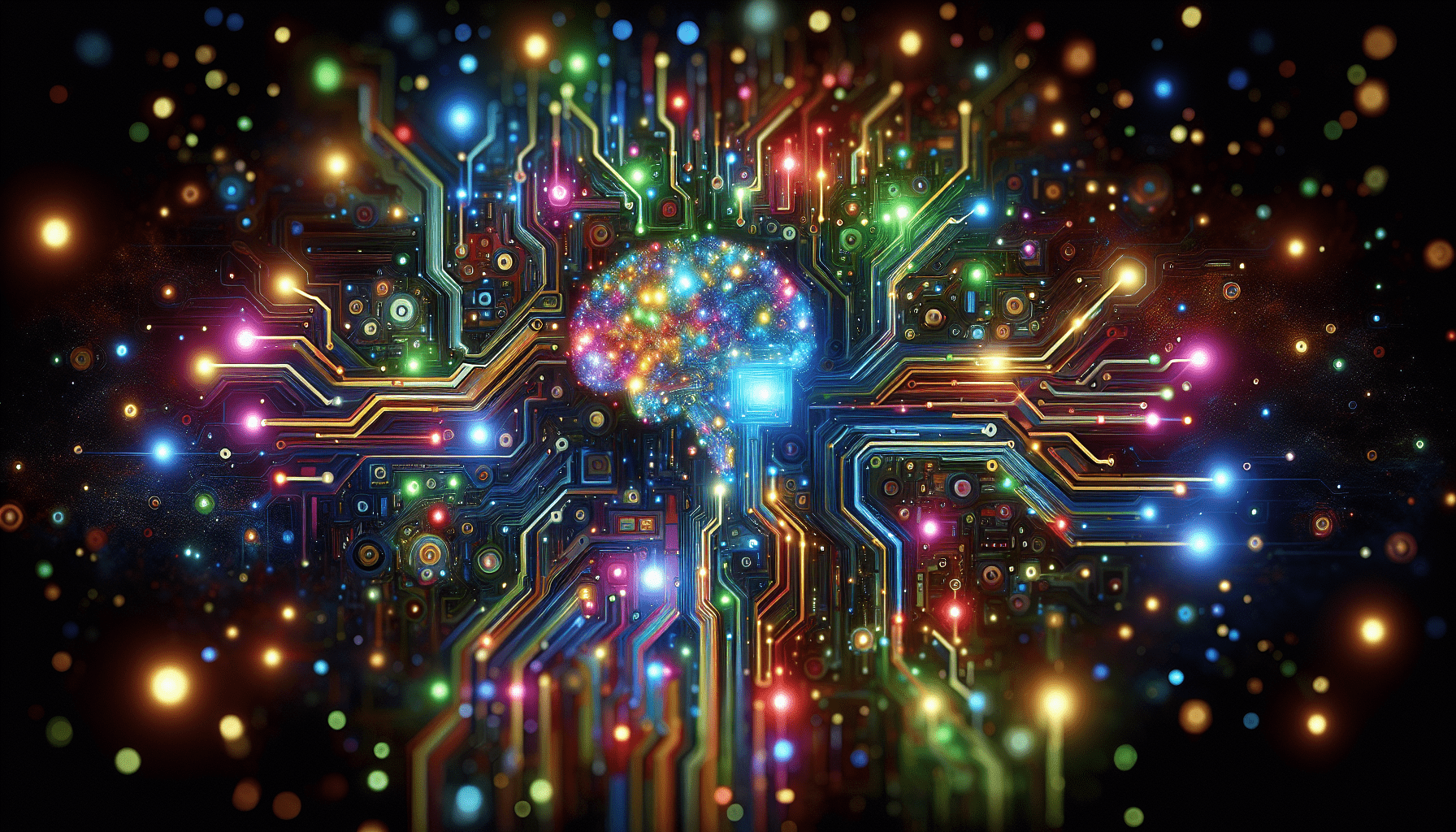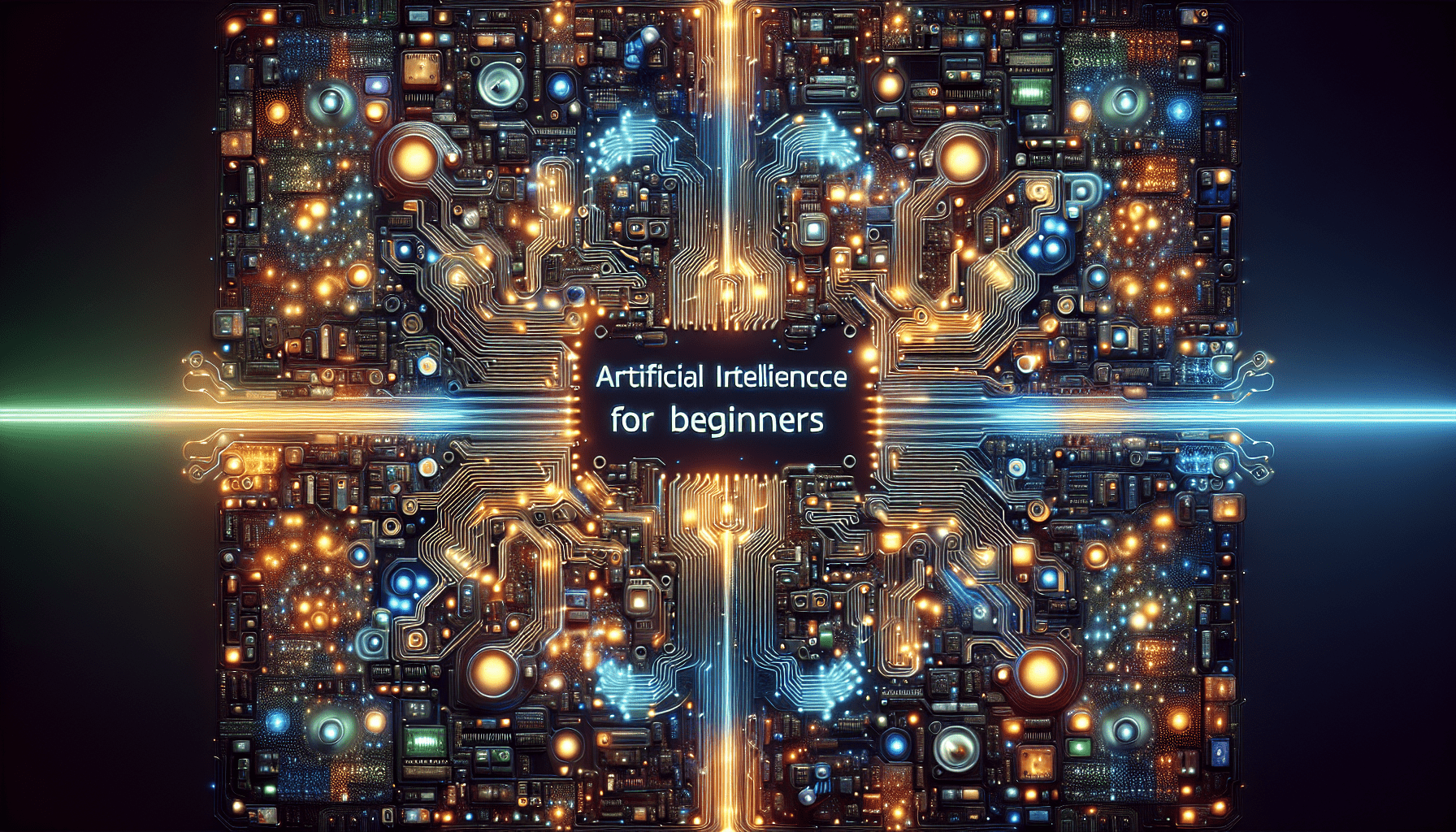Artificial Intelligence, or AI for short, has become an integral part of our daily lives, from voice assistants like Siri and Alexa to personalized recommendations on streaming platforms. Curious about what AI is all about? This article serves as a friendly introduction, providing newcomers with a glimpse into the fascinating world of Artificial Intelligence. Whether you’re a tech enthusiast or simply curious about how machines can mimic human intelligence, join us on a journey where we demystify the complexities of AI and make it accessible to everyone, regardless of your background or expertise. So, let’s embark on this exciting adventure together and uncover the wonders of Artificial Intelligence for newbies.

Overview of Artificial Intelligence
Artificial Intelligence (AI) refers to the development and implementation of computer systems that can perform tasks that would typically require human intelligence. These tasks include problem-solving, decision-making, learning, and understanding natural language. AI technology has evolved rapidly over the years, transforming various industries and revolutionizing the way we live and work. In this article, we will explore the definition, history, importance, types, applications, ethical considerations, challenges, working principles, future trends, career opportunities, and resources related to Artificial Intelligence.
Definition of Artificial Intelligence
Artificial Intelligence can be defined as the branch of computer science that focuses on creating intelligent machines capable of mimicking human-like behaviors. These intelligent machines can simulate human cognitive processes such as reasoning, problem-solving, learning, and perception. The goal of AI is to develop systems that can autonomously analyze data, adapt to new situations, and make informed decisions without explicit programming.
History of Artificial Intelligence
The history of Artificial Intelligence dates back to the mid-20th century when researchers began exploring the concept of creating machines that could simulate human intelligence. In 1956, the term “Artificial Intelligence” was coined, and the field gained recognition as a distinct discipline. Since then, AI has witnessed significant advancements and breakthroughs. From early expert systems to the development of machine learning algorithms, AI has progressed exponentially, leading to the emergence of various AI applications that impact our daily lives.
Importance of Artificial Intelligence
Artificial Intelligence has become increasingly important due to its potential to solve complex problems, increase efficiency, and augment human capabilities. AI-powered technologies have the ability to analyze vast amounts of data, making it invaluable in fields such as healthcare, finance, logistics, and customer service. AI systems can process information faster and more accurately than humans, enabling businesses to make data-driven decisions and gain a competitive edge. Furthermore, AI has the potential to address societal challenges, improve safety, and enhance overall quality of life.

Types of Artificial Intelligence
Artificial Intelligence can be categorized into different types based on its capabilities and functionalities. The three main types are Narrow AI, General AI, and Super AI.
Narrow AI
Narrow AI, also known as weak AI, refers to AI systems designed to perform specific tasks or solve specific problems. These systems are designed to excel in a particular domain and are not capable of general intelligence. Examples of Narrow AI include voice assistants like Siri and Alexa, recommendation algorithms used by streaming platforms, and virtual customer service agents.
General AI
General AI, also known as strong AI, refers to AI systems that possess human-level intelligence and can understand, learn, and perform any intellectual task that a human being can. General AI aims to replicate human intelligence and exhibits a broad range of cognitive abilities. While General AI is still largely theoretical, researchers continue to explore the possibilities and challenges associated with creating machines that can achieve this level of intelligence.
Super AI
Super AI, also known as artificial superintelligence, surpasses human intelligence and capabilities. This level of AI goes beyond human-level understanding and has the potential to outperform humans in almost every aspect. Super AI has raised significant ethical concerns and debates, as its impact and potential consequences are not yet fully understood. The development of Super AI requires careful consideration and regulation to ensure its responsible and beneficial use.
Applications of Artificial Intelligence
Artificial Intelligence finds applications in various domains. Some of the notable applications include Natural Language Processing, Machine Learning, Computer Vision, and Robotics.
Natural Language Processing
Natural Language Processing (NLP) is an AI subfield that focuses on enabling machines to understand, interpret, and respond to human language. NLP technologies power voice assistants, language translation systems, sentiment analysis tools, and text summarization algorithms. NLP advancements have greatly improved human-computer interactions and have opened up new possibilities for automated language processing.
Machine Learning
Machine Learning is a subset of AI that involves designing algorithms that allow computers to learn from data and make predictions or decisions without being explicitly programmed. Machine Learning algorithms can identify patterns, make accurate predictions, and improve their performance over time through the analysis of large datasets. This technology is used in various fields, such as finance, healthcare, marketing, and recommendation systems.
Computer Vision
Computer Vision is an AI field that focuses on enabling machines to interpret and understand visual information, similar to how humans process images and videos. AI-powered computer vision systems can analyze and extract information from images and videos, enabling applications such as facial recognition, object detection, image classification, and autonomous vehicles. Computer vision is widely used in surveillance, medical diagnostics, and industrial automation.
Robotics
Robotics is a discipline that combines AI, machine learning, and mechanical engineering to create autonomous machines capable of interacting with the physical world. AI-enabled robots can perform tasks such as assembly, navigation, exploration, and assistance. They are used in industries like manufacturing, healthcare, agriculture, and space exploration. Robotics has the potential to revolutionize industries, improve efficiency, and enhance human safety.

Ethical Considerations in Artificial Intelligence
As AI continues to evolve and become more integrated into our lives, it is crucial to consider the ethical implications and ensure responsible development and use of AI technologies. Some of the key ethical considerations in Artificial Intelligence include Bias and Fairness, Privacy and Security, and Accountability and Transparency.
Bias and Fairness
AI systems are trained on large datasets, and if these datasets are biased, the AI system can inherit and amplify the biases present in the data. Biased AI systems can lead to unfair outcomes, reinforce discrimination, and perpetuate societal inequalities. Developers and researchers need to address bias and strive for fairness in AI models and algorithms to ensure that AI does not perpetuate or amplify existing societal biases.
Privacy and Security
AI systems often rely on vast amounts of user data to make predictions and decisions. Privacy and security concerns arise when personal data is collected, stored, and processed without proper consent or protection. It is essential to establish robust safeguards and regulations to protect user privacy, secure sensitive data, and mitigate the risks associated with potential misuse of AI.
Accountability and Transparency
AI systems can make decisions that impact individuals and society as a whole. It is important to establish clear accountability mechanisms to ensure that AI systems can be held responsible for their actions and decisions. Transparency in AI systems is crucial to understand how these systems function and make decisions, enabling users to trust and scrutinize the AI technology.
Challenges and Limitations of Artificial Intelligence
While Artificial Intelligence holds immense potential, it also faces several challenges and limitations that need to be addressed for its responsible and beneficial use.
Data Limitations
AI algorithms require vast amounts of high-quality data to train effectively. However, not all industries or domains have access to such data, limiting the applicability of AI systems in certain areas. Insufficient or poor-quality data can lead to biased or inaccurate AI models, compromising the reliability and performance of AI systems.
Ethical and Social Implications
The rise of AI presents ethical and social implications that need to be carefully addressed. Questions about job displacement, algorithmic fairness, and the impact on individual privacy and autonomy have emerged. It is crucial to have open and inclusive discussions to navigate these challenges and ensure that AI development considers the broader societal implications.
Lack of Human-like Understanding
While AI systems excel in specific tasks and domains, they often lack the nuanced understanding and common sense reasoning that humans possess. AI struggles with context, sarcasm, and ambiguous situations. This limitation poses challenges in real-world scenarios that require human-like understanding and critical thinking.

How Artificial Intelligence Works
Artificial Intelligence systems comprise several components that work together to perform intelligent tasks. These components include data collection and processing, algorithms and models, training and testing, and decision making.
Data Collection and Processing
AI systems require large amounts of data to learn and make intelligent decisions. Data is collected from various sources, such as sensors, databases, and the internet. This data is then processed and prepared for analysis, ensuring its quality, relevance, and accuracy.
Algorithms and Models
AI algorithms form the backbone of AI systems. These algorithms are designed to process and analyze data, identify patterns, and make predictions or decisions. Different AI algorithms are used for various tasks such as classification, regression, clustering, and reinforcement learning. Each algorithm has its strengths and weaknesses, making it important to choose the right algorithm for the task at hand.
Training and Testing
AI models need to be trained on labeled datasets to learn patterns and make accurate predictions. Training involves feeding the AI system with labeled data and adjusting the model’s parameters to minimize the error. Once trained, the AI model is tested on new, unseen data to evaluate its performance and identify areas for improvement.
Decision Making
Once trained, AI models can make decisions or predictions based on the input data. These decisions can be in the form of recommending a product, categorizing an image, or suggesting the best course of action. The output of AI systems can help humans in decision-making processes or autonomously perform tasks without human intervention.
Future Trends in Artificial Intelligence
Artificial Intelligence is an evolving field, and several trends are shaping its future development and applications. Some key future trends in AI include advancements in Machine Learning, integration with the Internet of Things (IoT), and the development of Quantum Computing.
Advancements in Machine Learning
Machine Learning is continually evolving, and new techniques, algorithms, and models are being developed. Advancements in deep learning, reinforcement learning, and transfer learning are pushing the boundaries of what AI can achieve. Machine Learning is expected to play a critical role in various industries, including healthcare, finance, cybersecurity, and personalized recommendation systems.
Integration with Internet of Things
The Internet of Things (IoT) refers to the network of interconnected devices that collect and exchange data. AI technologies are increasingly being integrated with IoT devices, enabling them to process data in real-time, make intelligent decisions, and automate tasks. The combination of AI and IoT has the potential to improve efficiency, enable predictive maintenance, and enhance the overall user experience.
Development of Quantum Computing
Quantum Computing holds the promise to revolutionize the field of Artificial Intelligence. Quantum computers have the potential to solve complex problems exponentially faster than classical computers, opening up new possibilities and capabilities for AI systems. Quantum AI algorithms are being developed to tackle optimization, simulations, and machine learning tasks. However, Quantum Computing is still in its early stages, and further research and development are required to unlock its full potential.

Career Opportunities in Artificial Intelligence
As AI continues to advance and permeate various industries, career opportunities in Artificial Intelligence are on the rise. Some of the prominent careers in AI include AI Engineer, Data Scientist, and Machine Learning Specialist.
AI Engineer
AI Engineers are responsible for designing, developing, and implementing AI systems. They work on developing algorithms, creating models, and integrating AI technologies into existing systems. AI Engineers need a strong background in computer science, mathematics, and programming, along with skills in machine learning, data analysis, and software development.
Data Scientist
Data Scientists play a critical role in AI projects, as they are responsible for analyzing, interpreting, and extracting insights from data. They work on data collection, preprocessing, feature engineering, and model building. Data Scientists need expertise in statistics, machine learning, programming, and data visualization.
Machine Learning Specialist
Machine Learning Specialists focus on developing and implementing machine learning algorithms and models. They work on data preprocessing, feature selection, hyperparameter tuning, and model evaluation. Machine Learning Specialists need a deep understanding of machine learning algorithms, mathematics, statistics, and programming.
Resources and Learning Materials
For individuals interested in learning more about Artificial Intelligence, there are numerous resources and learning materials available.
Online Courses and Tutorials
Online platforms like Coursera, Udacity, and edX offer a wide variety of AI courses and tutorials. Some popular courses include “Machine Learning” by Andrew Ng and “Deep Learning Specialization” by deeplearning.ai. These courses provide a comprehensive introduction to AI concepts, algorithms, and applications.
Books and Publications
Several books serve as excellent resources for understanding AI principles and applications. “Artificial Intelligence: A Modern Approach” by Stuart Russell and Peter Norvig is a widely acclaimed textbook that covers various AI topics. Additionally, “Deep Learning” by Ian Goodfellow, Yoshua Bengio, and Aaron Courville provides in-depth coverage of deep learning techniques.
AI Community and Forums
Engaging with the AI community and participating in forums can provide valuable insights and learning opportunities. Platforms like Kaggle, Stack Exchange, and AI-related subreddits offer a platform to connect with AI enthusiasts, ask questions, and share knowledge. Joining AI meetups and attending conferences can also facilitate networking and knowledge sharing.
Conclusion
Artificial Intelligence is a rapidly evolving field that has the potential to transform industries, solve complex problems, and enhance human capabilities. By enabling machines to mimic human intelligence, AI is revolutionizing various domains, from healthcare and finance to transportation and customer service. With advancements in technologies like machine learning, computer vision, and robotics, AI-driven systems are becoming increasingly powerful and capable. However, it is crucial to address ethical considerations, overcome challenges, and ensure responsible development and use of AI technologies. As AI continues to progress, it presents exciting career opportunities and a vast array of resources to learn and explore. Whether you are a newbie or an experienced professional, venturing into the world of Artificial Intelligence promises an exciting journey filled with innovation and possibilities.






Leave a Reply